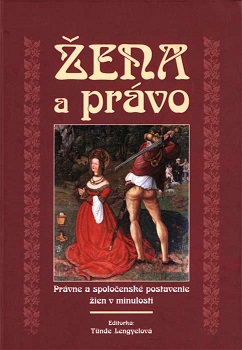Manželstvo a výber partnera v Rakusku v ranom novoveku
Marriage and the choice of one's partner in Austria in the early modern period
Author(s): Beatrix Bastl
Subject(s): Gender Studies, Sociology, Modern Age, Culture and social structure , Family and social welfare
Published by: SAV - Slovenská akadémia vied - Historický ústav SAV
Keywords: Austria; modern period; marriage; social event; partner choice; widow;
Summary/Abstract: Marriage was not a private act, but a social event with economic consequences. This was the reason why various factors such as economic profit for the family, traditional respect for equality of partners in social hierarchy, continuity of a family line and provision of some nobility estates influenced the choice of one’s partner. Nevertheless, there were cases when a son or a daughter did not comply with the plans of their parents and came into conflict with them. Spontaneous love could destroy carefully inter¬connected system of economic interests and significance of hierarchy. These were the underpin¬nings of a complex marriage system, an intricate picture of society in which everybody seemed to be related to everybody. The marriage circles were closed to outsiders from several causes. One was quality and structure of representative choice and the other a tendency of nobles to marry equally. Other reasons included circle of friends and family ties as well as local client system. The law of the country and the dynasty law of succession determined destiny of family mem¬bers. It was not only splendor familia, a notion that became a legal term, but also political wisdom that decided about marriages and a proper life-style of individual family members. Negotiations about marriages and testaments revealed the power and hierarchy of genders. They represent legal documents of an aristocratic system of gifts and benefits or a kind of a gift game. Analysed prenuptial agreements had a following structure: Aim of the contract (arenga), engagement or marriage clause, religious clause (in case of mixed marriages) and the most extensive was the part about marital property law including dowry, trousseau, a gift from the husband after the wedding night (Morgengabe), marriage gift and widow’s allowance. Quality and quantity of a dowry formed one part of the system. The acceptance of a marriage gift from a man was of great significance and formed an obligation. Dowry excluded a woman not only from their hereditary right to paternal property, but noticeably restricted also their birthright to family or parental property. The character of this exclusion suggests that it was a male privile¬ge. Also, preference to give a dowry in cash indicates a tendency to disinherit women. Evidence of such practice is present also in above mentioned prenuptial agreements and marriage contracts. Dowry in the form of an estate was too precious to give away with a daughter. Strategic lucrative estates were reserved for male descendants, though the procedure varied depending on the struc¬ture of an individual family. Widows were entitled to an appropriate residence, subsistence allo¬wance, annual allowance and payment for Widow years i.e. the earliest possible departure of the widow from the estate. In case of marriages of daughters-heiresses, husband was to take the name of the bride’s family or at least add it after his family name.
Book: Žena a právo. Právne a spoločenské postavenie žien v minulosti
- Page Range: 164-176
- Page Count: 13
- Publication Year: 2004
- Language: Slovak
- Content File-PDF

